Identity Review | Global Tech Think Tank
Keep up with the digital identity landscape.
Sustainable city development has emerged as an imperative solution for addressing the pressing challenges of urbanization and environmental degradation, with cities generating over 70% of global greenhouse gas emissions and accommodating more than half of the world’s population. Urbanization is expected to continue at an unprecedented rate, with an estimated 68% of the world’s population projected to reside in cities by 2050. This rapid urban growth calls for innovative solutions to address resource depletion, congestion, pollution, and social inequalities.
The following 15 thought leaders have risen to the forefront, guiding the transformation of cities into environmentally responsible, socially inclusive, and economically vibrant hubs.
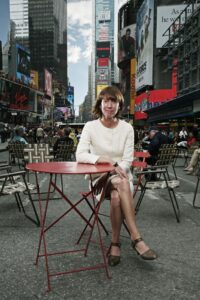
Janette Sadik-Khan, former Commissioner of the New York City Department of Transportation, is renowned for her groundbreaking work in transforming New York City’s streets. She emphasized pedestrian-friendly infrastructure, overseeing a $2.8 billion budget to pedestrianize Times Square and redesign 2.3 miles of Broadway Street. Other ambitious projects included launching the nation’s largest bike-share program and creating nearly 400 miles of bicycle lanes.
“We have to make spaces where people want to be and not just drive through. So the strategies that cities and mayors around the world are embracing are ways to make it possible for people to get around easier on bike and foot and bus and creating spaces people want to be,” Sadik-Khan said.
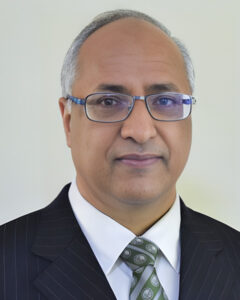
Dr. Shobhakar Dhakal, the Vice President for Academic Affairs at the Asian Institute of Technology in Thailand, focuses on urban energy systems and low-carbon development. His research highlights the pivotal role of cities in mitigating climate change, with research projects exploring energy supplies in isolated areas and building sustainable growing settlements.
“Our ability to make deep cuts to global greenhouse gas emissions depends to a large extent on what kinds of cities and towns we build,” said Dhakal. He believes that some of the biggest opportunities to put the world on a different pathway lie in fast-growing cities.
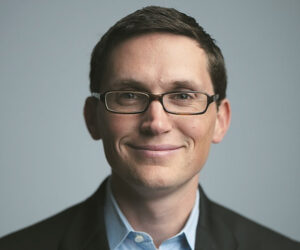
Sadhu Johnston, the former City Manager of Vancouver, spearheaded efforts to make the city more resilient and sustainable. As City Manager, he managed a $1.6B operating budget and more than 7,000 employees to address the homelessness and housing crises. He left having pioneered a variety of green initiatives, including the Greenest City Action Plan, carbon emissions reductions, waste diversion programs, separated bike lanes, and more.
“Sadhu has helped the City of Vancouver push forward many innovative and challenging initiatives that have helped Vancouver tackle critical issues, and none were as transformative to the City as the Greenest City Action Plan. You can’t create systemic change without being able to completely reform how every single city department functions and works with one another” Vancouver Mayor Kennedy Stewart said in an interview with Canada’s National Observer.
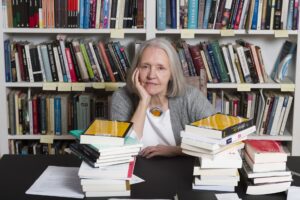
Saskia Sassen, a renowned sociologist and urban theorist, studies intricate connections between global cities and the economy at Columbia University, where she currently serves as the Robert S. Lynd Professor of Sociology and Co-Chairs The Committee on Global Thought. She won the 2013 Principe de Asturias Prize in the Social Sciences and has authored several books, including Cities in a World Economy (4th edition), A Sociology of Globalization, and more.
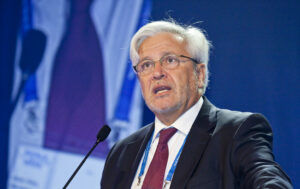
Dr. Joan Clos, former Executive Director of UN-Habitat, has been a vocal advocate for sustainable urban development worldwide. Having served two terms as the Mayor of Barcelona, the Spanish Ambassador to Turkey and Azerbaijan, and the Minister of Industry, Tourism, and Trade of Spain, Dr. Clos has received a number of awards for his work, including a gold medal from the Royal Institute of British Architects in 1999 and the UN-Habitat Scroll of Honour Award in 2002.
When asked about his personal inspiration for the work he does in transport and climate change, Dr. Clos said, “Cities are the engines of economic growth and social development and have a key role in the efforts to rein in climate change. UN-Habitat has much to offer in making the process of urbanization sustainable, through its expertise and shared best practice from cities around the world.”
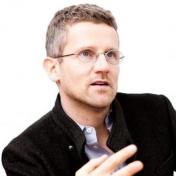
Carlo Ratti, an architect and engineer, is renowned for his innovative designs that blend technology, sustainability, and human-centered design principles. He envisions cities as living laboratories for experimentation, teaching at MIT and directing the MIT Senseable City Lab. There he advocates for using data and technology to create smarter, more sustainable urban environments. Ratti has co-authored over 500 publications and holds several patents for works that have been featured in museums across the world. Two of his projects — the Digital Water Pavilion and the Copenhagen Wheel — were featured by TIME Magazine as some of the ‘Best Inventions of the Year’. Ratti and his team recently developed a new skyscraper model called the ‘farmscraper’, which saves transportation costs and reduces emissions by using hydroponics in the facade to grow foodstuffs and regulate the temperature of the building.
“It sounds cliche, but challenge and opportunity really are two sides of the same coin here. To paraphrase Richard Buckminster Fuller, how we approach urban development today will determine our destiny – utopia or oblivion. To avoid the latter, architects have to change focus. They should stop thinking about beautifying existing objects and should focus on the big challenges of our times – first and foremost, climate change,” said Ratti.
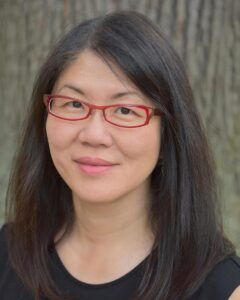
Dr. Karen Seto, the Frederick C. Hixon Professor of Geography and Urbanization Science and Director of the Hixon Center for Urban Ecology at Yale University, is one of the world’s leading authorities on how urbanization will affect the planet. As an expert in satellite remote sensing, her research has made discoveries on how urbanization will affect climate change, food systems, and biodiversity. She developed the first global forecast of urban land use change, and she has co-led two chapters of the United Nations’ IPCC climate change reports on how cities can mitigate climate change.
“Cities must be a central component of solving climate change and biodiversity loss. Urban solutions can create healthier cities for people and the planet. We have the technology and we know how to do it. What we need is to bridge the science to practice for both existing cities and cities of tomorrow that have yet to be built,” said Dr. Seto.
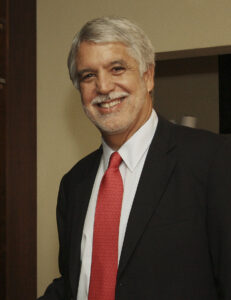
Enrique Peñalosa, former Mayor of Bogotá, Colombia, transformed the city into a model of sustainable urban development. While mayor, Peñalosa increased children enrollment in public schools by a 34% increase, built hundreds of kilometers of pedestrian paths, planted 100,000+ trees, and created a new transit system called TransMilenio. His focus on public transportation, cycling infrastructure, and public space revitalization earned him international acclaim. He is on the board of directors at the Institute for Transportation and Development Policy, where he focuses on promoting sustainable and equitable transportation worldwide.
“The world’s environmental sustainability and quality of life depends to a large extent on what is done during the next few years in the Third World’s 22 mega-cities. There is still time to think different… there could be cities with as much public space for children as for cars, with a backbone of pedestrian streets, sidewalks and parks, supported by public transport,” said Peñalosa.
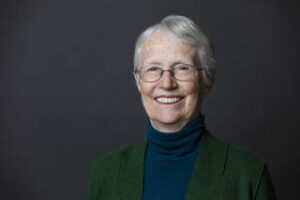
Dr. Cynthia Rosenzweig, a senior research scientist at the NASA Goddard Institute for Space Studies, studies climate change impacts on cities. She serves as Co-Chair of the New York City Panel on Climate Change, advising the city on adaptation for its critical infrastructure. Dr. Rosenzweig recently received the 2022 World Food Prize from the World Food Prize Foundation for her research on the relationship between climate and food systems. She forecasted how both will change in the future, providing a fundamental foundation for global leaders to implement climate change mitigation strategies and adapt food systems.
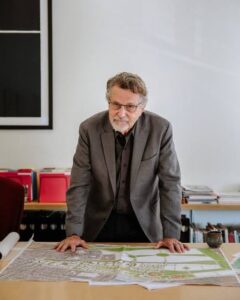
Peter Calthorpe, an urban designer and planner, has made significant contributions to sustainable city development through his pioneering work on transit-oriented development and walkable communities. He developed the concept of Transit-Oriented Development in the early 1990s, which focuses on creating vibrant, mixed-use neighborhoods where residents can easily access daily needs within a short walk or bike ride. Calthorpe’s vision has been instrumental in reducing car dependency and mitigating greenhouse gas emissions. He was awarded Urban Land Institute’s J.C. Nichols Prize for Visionaries in Urban Development in 2006 for his work.
Calthorpe explains, “The next generation of transit can be enhanced by autonomous technology. While applying this new tech to private autos will only increase driving and sprawl, using it to support shared vehicles on protected lanes will transform transit as we know it. Faster and lighter than Light Rail or Bus Rapid Transit (BRT) systems, what I call Autonomous Rapid Transit (ART) would run small self driving 4 person transit pods in protected lanes on direct to destination routes – no waiting for the bus or train, no stopping at frequent stations, and reduced operating expenses without drivers. Such an on-demand electric system would run 24/7 and never run empty vehicles. Faster, cheaper, high efficiency and less energy demand than 20th century tech.”
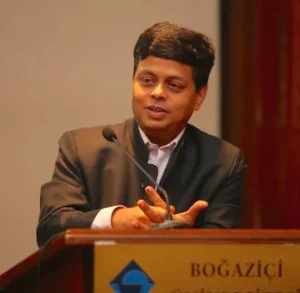
Dr. Aromar Revi, Director of the Indian Institute for Human Settlements, is a renowned expert in sustainable city development, particularly in the context of developing countries. He is Co-Chair of the UN Sustainable Development Solutions Network, where he led a global campaign for an urban Sustainable Development Goal. With a focus on urbanization challenges and climate change impacts, Dr. Revi emphasizes the urgency of action to build sustainable cities. His work encompasses research, policy advocacy, and practical solutions to promote resilient and inclusive urbanization, inspiring cities worldwide to address climate change and prioritize sustainable development.
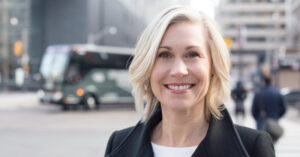
Dr. Jennifer Keesmaat is a renowned urban planner and thought leader who has made significant contributions to sustainable city development. As the former Chief Planner of Toronto, she played a pivotal role in shaping the city’s urban landscape. Keesmaat is known for her expertise in effective land-use planning and advocating for public transit expansion. She advocates for density and walkability, often focusing on mid-rise development, transportation, and waterfronts. Through strategic choices in growth and community connectivity, Dr. Keesmaat has been instrumental in guiding cities towards more sustainable and livable futures.
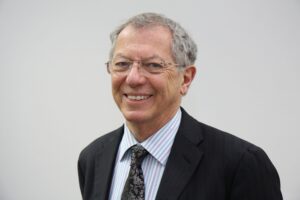
Sir David King, a scientist and former Chief Scientific Adviser to the UK government, has made significant contributions to science and policy. He has been a strong advocate for cities to become carbon-neutral and resilient in the face of climate change, having published over 500 research papers. Sir David King has emphasized the crucial role of cities in reducing greenhouse gas emissions and adapting to the impacts of climate change. Through his expertise and influence, he has promoted the integration of renewable energy, smart infrastructure, and sustainable transportation systems in urban planning. He holds 22 Honorary Degrees from universities worldwide, was knighted in 2003, and was made an Officer of the French Legion d’Honneur in 2009 for his work in the climate and energy challenge.
King details, “There is no conflict between economic growth and environmental sustainability. Sustainable economic growth absolutely depends on cities thinking forward and building-in resilience to the climate changes ahead. The energy transition to renewables and net zero emissions must take place now for humanity to survive and thrive,” said King. “This means, for example: Transport systems must be built around active travel and good public transport. People, not cars, should be the center of transport planning. Future housing must maximize passive heating and cooling, and be built to last. Materials must be locally sourced as much as possible – with designs and structures respecting local conditions and valuing local knowledge and culture. Energy must be renewable – solar, wind, tidal.”
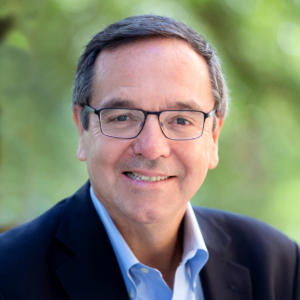
Gil Penalosa is the founder of 8 80 Cities, a non-profit organization dedicated to creating cities that are accessible and enjoyable for people of all ages and abilities. Penalosa’s work focuses on transforming post-pandemic urban environments to prioritize pedestrian and cyclist-friendly infrastructure, public spaces, and active transportation. Penalosa has advised decision-makers in more than 350 cities around the world.
“The message is simple and powerful: what if everything in the city, from sidewalks to libraries to housing, is equally good for an 8-year-old and an 80-year-old? If this was the case, then it’d be good for everyone, from 0 to over 100. We must stop building cities as if everyone was 30 years old and athletic and instead create communities for all,” said Penalosa.
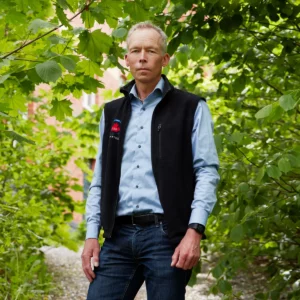
As the director of the Potsdam Institute for Climate Impact Research, Johan Rockström advises governments, corporations, and activists about the latest research on climate. His work emphasizes the integration of social, ecological, and economic systems to build sustainable cities that can withstand environmental shocks and promote long-term well-being. He partnered with David Attenborough to create Netflix series, Breaking Boundaries: The Science of Our Planet, and co-organized a declaration at the Nobel prize summit with 126 Nobel laureate signees to issue a planetary emergency.
“People feel they have to choose between immediate wealth and protecting the planet. That is an obsolete and incorrect way of communicating. The indifferent majority will only come with us if the sustainable route is not just more attractive but easier. The moment we succeed is when people are sustainable without knowing it; they simply choose the right tomatoes because they taste better and they are cheaper,” said Rockström.
These 15 thought leaders exemplify the diverse perspectives and expertise required to tackle the complex challenges of sustainable city development. As we look to the future, their insights, research, and advocacy will continue to shape the cities of tomorrow.
ABOUT IDENTITY REVIEW
Identity Review is a digital think tank dedicated to working with governments, financial institutions and technology leaders on advancing digital transformation, with a focus on privacy, identity, and security. Want to learn more about Identity Review’s work in digital transformation? Please message us at team@identityreview.com. Find us on Twitter.
RELATED STORIES